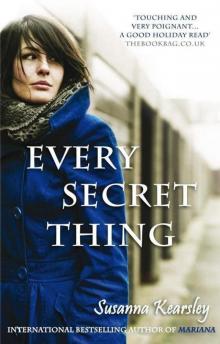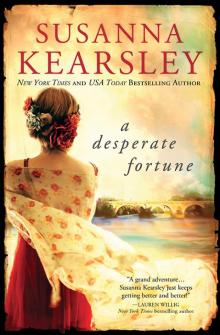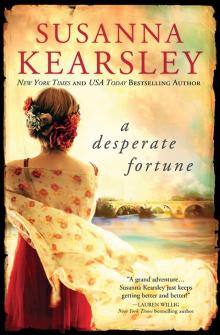- Home
- Susanna Kearsley
Desperate Fortune Page 10
Desperate Fortune Read online
Page 10
I didn’t even know the other woman’s name. “What would you say that is?” I asked Claudine, and pointed to the name that had been scored through several times in ink to render it illegible. “Harrison? Mistress Harrison?”
“Possibly.” She leaned in for a closer look, and placed her hand directly on the page.
I felt my mouth fall open but I caught myself in time and didn’t comment. I’d assumed, from her refusal to allow the diary to be moved or copied, that Claudine would have concerns about the way that it was handled. I had done a detailed search on how to work with paper artifacts. I’d hunted down a shop that sold supplies designed for libraries and archives, and I’d built myself a kit of sorts to bring with me—a desktop beanbag pillow to support the diary in a way that spared its fragile spine, and little leather weights to gently hold the pages open while I worked. And even though the current state of research seemed divided as to whether the advantages of wearing gloves outweighed the disadvantages, I’d erred upon the side of caution and brought several pairs of cotton gloves to keep the paper safe from the potentially destructive oils that, regardless of how many times I washed my hands, remained on my own fingers.
I might simply have concluded that Claudine was one of those who thought that gloves were not desirable or necessary when one touched old paper, and that keeping one’s hands clean and dry was all that was required, except I’d seen her not five minutes earlier spill coffee on that same hand when she’d set her cup down on the desk, and all she’d done was wipe it dry with tissue, and that hand was now laid full upon the diary.
The coffee on the desk had been enough to make me wonder, with the diary sitting open so close by, but I had held my tongue then too, recalling Jacqui’s years of telling me that pointing out another person’s faults was rarely wise. And it was Claudine’s diary, after all. Not mine.
I looked away deliberately and focused on the other features of the room instead. I liked this room. It was much smaller than the others I had so far seen within the house, and set just off the entry hall across from the salon, so that its windows—there were two, set close together—overlooked the narrow terrace and the front drive with its chestnut trees. The floor was done in hardwood in the same herringbone pattern as the salon and the dining room and overlaid, as they were, with an oriental carpet, and the walls were painted warmly yellow, making things feel cozier. I liked the desk, too. It was large and serviceable, made for work and not for decoration, and had room enough for me to set the diary on its pillow in the middle with my working papers and my pencils to the right, and still leave ample space for the ceramic table lamp that squatted to the left, its large shade angled perfectly to cast light where I needed it.
But best of all, there was no second chair in here—no place for someone else to sit and socialize while I was working. I could work, as Jacqui had assured me I’d be able to, alone.
My cousin, knowing I preferred to work with no one else around me, had considerately stayed to drink her coffee in the dining room, where I could hear her talking now in English with Denise and Luc, no doubt attempting to keep them both there as well, and let me have my breathing space.
But it was Claudine’s house, and Claudine’s diary, and I couldn’t tell her not to come along, and not to touch it.
“Yes, I think it might be Harrison,” she said at last, and straightened.
As her fingers left the page I looked for any signs of damage to the paper and found none, although I knew such damage could take time to show.
“Your cousin,” Claudine told me, “when she came last June to see this, could not make that word out either. Nor this one.”
“That’s ‘Frisque.’ See how she writes her F’s, and then the s? It’s probably a dog’s name, as she says that she ‘attends to’ Frisque by walking outside in the cold, and then they both come back indoors. A dog’s the only pet that people walk and bring indoors again. At least the only pet that I can think of.”
“So she had a dog? How very clever of you, spotting that.”
I didn’t think it all that clever. I had seen some samples of old documents, old handwriting, and I’d been braced to find this entry of the diary tricky to transcribe, but in fact Mary Dundas had written her words in a very clear hand. It was fairly elaborate, and she wrote her l’s and her t’s in a manner that made it a bit of a chore to tell one from the other, but still it was perfectly legible.
Claudine leaned over again to touch three little blots in the margin. “And what are these, do you think? Numbers?”
“They could be.” I’d brought a magnifying glass with me as well, on the advice of the shopkeeper from whom I’d bought my archival supplies, and I lifted it now to examine that part of the page. The three marks had been meant to conceal what she’d written beneath, as she’d done with the name of the woman she’d met at Sir Redmond’s. “Yes, they’re numbers. That’s eight, and that’s nine. And that last one,” I said, “might be ten. I’m not certain.”
“A key to the cipher, perhaps?”
“Not the key. That would be on its own separate paper, it’s probably lost. But the numbers might still be a clue of some kind.” I had glanced at the pages that followed—no words, only numbers divided by points, looking just like the cipher that Alistair had given Jacqui to test me with. Only it wasn’t the same. “I don’t know, it’s a lot of effort to go to for something so commonplace,” I said, choosing to ignore that I’d done much the same thing years ago when I’d encrypted all my school notes. “She’d have had to work out what she wanted to write down, and then translate it into cipher. All these pages. That would take a lot of time.”
Claudine remarked, “She must have had her reasons.”
I, for one, could not imagine what would make an ordinary woman keep a diary in the first place. I could never see the point in taking time in which you could be doing something, and then simply wasting it by writing down the things you had already done. But Mary Dundas clearly had not shared my view.
Her diary was the size and thickness of a modern hardcover novel, with a leather spine and worn cloth-covered boards and pages turned a golden beige by time, and with a texture of fine ribbing that I gathered was a feature of the way that it had been produced. The color of the ink had changed, as well. It would have once been black, but time had faded it to brown, though it was dark enough to stand out easily against the page.
For all its age and wear, someone had taken quite good care of it. And judging from the way that she had handled it this morning, I was fairly sure that person had not been Claudine.
I asked, “How did you come by this? It’s not a family heirloom, is it?”
“No. Oh, no, my family does not keep such things. They are not sentimental for the past. But several years ago here in Chatou there was an antiques market, and I saw this in a stall and thought that it might be of interest to…” She coughed, and raised her cup to take a drink of coffee. “It looked interesting. Can you break the cipher, do you think?”
“I’ll do my best.”
“I’ll leave you to it, then.” She closed the double doors as she went out, and I was left in blissful solitude—the thing I had been wanting all along.
I turned the diary to the first page written in the cipher, and began to work.
* * *
It should have been a simple thing. Mary Dundas had told me so herself, in words so plain I could not misinterpret them:
And she observing I was writing private thoughts advised me there were ways to write in secret, and when I replied I had no head for ciphers she assured me any person could devise one using anything to hand, whereon she crafted one upon the spot so simple in design that I do presently intend to follow her advice and practice it.
“So simple in design,” the diary promised, yet three days had passed and I had come no closer to unraveling the cipher that another woman had devised “upon the spot�
� while drinking tea. It drove me to distraction.
I had barely noticed Jacqui leaving Monday. She had smiled and kissed me lightly on the head and given me a hug and seeing I was well absorbed in work, had tiptoed quietly away to drive herself back to the airport. If the house felt slightly different with her gone, I’d scarcely noticed it. I’d socialized when necessary, sharing an aperitif with Claudine every evening before joining her at dinner, where I’d let her take the lead in conversation, which so far had touched on local wines, the euro, and photography, three things that I knew little of myself, so it was natural for me to be the audience for her impromptu and impassioned lectures.
If I had not seen Luc Sabran—which to be honest I had noticed slightly more than other things—it was because he had returned to work after the holidays, and truly it was just as well to not have the distraction.
It was bad enough the cat had found a way to sneak into my workroom when he wanted to, and even though he was a cat and therefore understood the rules of solitude, it still was disconcerting to glance up and find he’d settled in his favorite spot atop the box of files by the windows and was watching me, the way cats did, with steady and unblinking eyes.
I felt the weight of his stare now and raised my head to meet it with my own. “Well then, you try it. See how you get on,” I challenged him.
He twitched an ear and wisely did not answer.
“Fine then. Don’t be so judgmental.” In frustration I turned back to the first entry of the diary and read through it for what seemed the thousandth time in search of clues. What cipher could a person craft that would be “simple in design” and “using anything to hand”? What would a person have “to hand” in those days in a house belonging to a man of some estate? I didn’t know what room they had been sitting in, for Mary never mentioned it. The drawing room, presumably. There was no way to tell. They’d been drinking tea, which meant there’d been a tea service: a tea tray, teacups, lumps of sugar. Totally unhelpful. A design upon the teacups? It was possible. There would have been a fireplace, with its andirons and tongs and pokers. And because Sir Redmond was a man of means and education, there might have been books.
If there’d been books, I thought, and if they’d used one as the basis for their cipher, I was in deep trouble, for the key they’d chosen could be anything: a passage from a poem, or some rare religious tract. Odds were I’d never track it down.
Not giving in to that depressing thought, I pulled my mind back forcibly to focus on the other possibilities. The dog, I thought. Or something that the dog had with it. Or the number of wood panels on the door…
The knock that interrupted didn’t fully register at first. I knew Denise’s knock by now—she usually knocked lightly in an effort not to startle me, not wishing to intrude.
I said, “Come in,” in French, and she put her head round the double doors.
“How does it go this morning?”
“Not well.”
“Oh,” she said. “Well, anyway, I’m leaving in a minute. If you want a little lunch before I go…perhaps some soup…”
“No, thanks. I’m fine.”
“You have to eat.” That was the mother in her talking now, I knew. She stood with hands on hips in the same stance that my own mother struck whenever she was getting set to tell me that I’d been indoors too long.
Denise, predictably enough, said, “You have been too long in this one room. You need a change of scene. Your brain can’t work without fresh air.”
Which from a scientific standpoint was debatable, I knew, but her suggestion of a change of scenery struck me suddenly as something that might be a good idea. Often when I labored on a tricky bit of programming, I found if I switched tasks to something simpler for a little while, my brain had time and space to better concentrate upon the more important problem.
And ever since it had been first suggested to me Sunday morning, there was one much simpler task I’d added to my list of things that needed doing. “Is it very difficult,” I asked Denise, “to get from here to Saint-Germain-en-Laye? Is there a train?”
She nodded. “Yes, the RER. But you don’t have to take it. I can drop you on my way, it isn’t far. I’m nearly ready. I just have to make a phone call first, then we can go. All right?”
The cat Diablo stared down from his perch atop the box of files and dared me to.
“I’ll get my coat,” I said.
Chapter 10
Denise drove fast, and played the radio—both things I found distracting, but today I was distracted even more by my imaginings.
The road to Saint-Germain-en-Laye looked much like any other road, but I was busy seeing it the way it would have been when Mary Dundas and her brother had presumably set out that afternoon from the house of Sir Redmond Everard. In Mary’s time—I’d worked it out—a horse and chaise could travel at an average speed of 1.65 leagues an hour, to use the standard reckoning for leagues in Paris, every district having its own measurements. And Chatou, from its center, lay approximately 1.7 leagues from Saint-Germain-en-Laye, which meant it would have taken Mary and her brother, in the winter, just above an hour to reach their final destination.
In the car, it took us fifteen minutes. Slightly less, the way Denise was driving.
We crossed the river by a long bridge, turned and wound our way around and up a road still edged with the remainder of the old town walls, then back along an avenue with trees cut in a box-like hedge and round again to where the old château sat facing down the huddled buildings at the center of the town. There was a church directly opposite with regal steps and pillars that looked every bit as old as the château, and both those buildings had retained their grandeur—but the modern world had crept right to their doorsteps.
Denise had pulled in to what looked like a long bay for buses to pick up and drop off their passengers. Pointing ahead she said, “There is the entrance. Or if you don’t want to go inside just yet, go through there, through that big gate, and down and around through the park and along the terrace—the long path overlooking the river. It’s really a beautiful walk, and the fresh air will help you change your thoughts,” she said, using the French phrase for clearing one’s mind. With a glance at her wristwatch she asked, “Will two hours from now be enough time?”
I wasn’t about to impose my own schedule on hers. “Tell me what time I need to be back here, and I’ll be here.”
“Three o’clock,” she said. “Be back at three.”
I said, “Thanks,” as I climbed from the car and she gave me a wave and was off again. The broad stretch of pavement in front of the château was practically empty, which suited me fine. I had never done well in the jostling confusion of crowds.
The château rose squarely in front of me, solid and soaring, designed to impress, yet it looked slightly lost. Like the house at Chatou it seemed fully aware that it should have had grander surroundings; as though it had slumbered and woken to find itself here at the edge of a street crowded round with tall mansard-roofed buildings, an outdoor café and the broad entrance into the underground RER station bookending the church on the opposite side, and it wasn’t quite sure how to manage the fact that the world had moved on.
It was built of that same pale stone that looked ivory in some lights and golden in others and gave French châteaux their own beauty. Today there was no sun to make that stone glow, only clouds in a flat winter sky, and the walls of the château thus robbed of their light had a dull ochre cast to them, only relieved by the contrasting red brick that trimmed the round walls of the turrets and towers and framed the tall arched rows of windows that lined the two uppermost stories, reflecting no image but that of the overcast sky.
Hardly welcoming, but then the point of my trip here today wasn’t to be made welcome. It was to learn the layout of the château and the grounds, to walk where Mary Dundas had once walked, so if I ever broke her cipher and began to read he
r diary entries I could understand them better.
Alistair considered it unlikely Mary’s brother and his wife and children would have lived within the château proper, because most of the apartments there were taken up by influential Jacobites and those who’d served the young King James’s mother while she’d lived. It was more probable, thought Alistair, that Nicolas Dundas on his return to Saint-Germain-en-Laye would have found lodgings for his family in the town that had grown up around the château walls to house the varied tradespeople and servants and supporters of the exiled royal court. But even so, the château and the people who had lived there would have been a daily feature of the life of Mary Dundas, and whatever events she described in her diary would need to be placed against that backdrop to be viewed in proper context.
I used my mobile now to take a few snaps of the château. When I got back to Chatou, I could create a file of photographs to reference when I was transcribing the diary. There, I thought. Pure optimism. Jacqui would be proud of me. She always told me I was far too quick to give up hope.
Moving in closer, I photographed some of the details: the balconies edged with stone railings that ran in a long line across the facade, and the carved stonework over the massive main entry doors set at the end of a narrow stone bridge leading over the dry grassy moat. Then I crossed that same bridge myself and went in.
I’d been warned by Denise that the château was now a museum, but in my mind I’d pictured something much like Hampton Court—rooms made to look as they’d looked in the past, with paneled beds and tapestries and those great portraits in which all the faces looked so much the same that to tell them apart was a challenge. But this wasn’t anything like that. The château had been entirely repurposed as a museum of archaeology, the old rooms all refitted with exhibits showing finds from Paleolithic times through the Bronze and Iron Ages, and the Romans to the early Modern era. They were probably important finds, but honestly I paid them no attention. I was more absorbed in searching out the little plaques explaining what the rooms had been originally, and in finding features that appeared to have survived unchanged, most notably the stairwells with their stone steps and their intricately vaulted stone-and-redbrick walls and ceilings, and the leaded windows looking out towards the central courtyard.

 Every Secret Thing
Every Secret Thing The Rose Garden
The Rose Garden A Desperate Fortune
A Desperate Fortune The Winter Sea
The Winter Sea Season of Storms
Season of Storms Mariana
Mariana The Splendour Falls
The Splendour Falls Named of the Dragon
Named of the Dragon Sophia's Secret
Sophia's Secret The Shadowy Horses
The Shadowy Horses The Firebird
The Firebird Desperate Fortune
Desperate Fortune